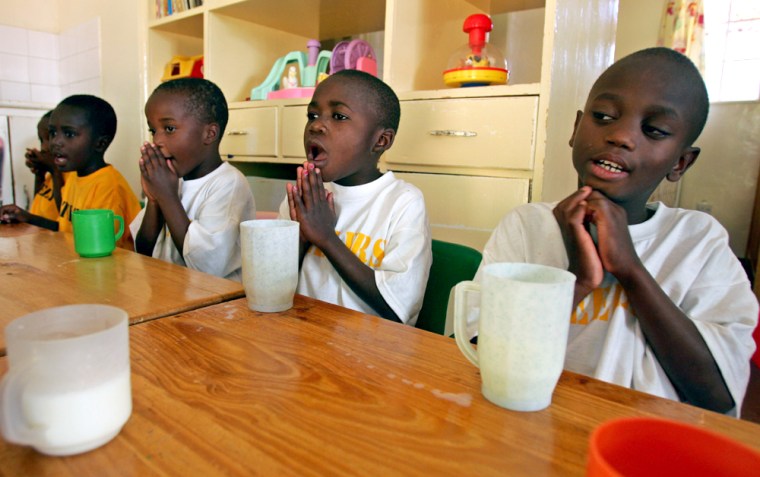Monica is 12, likes ice cream, thinks boys are rough and dirty, and wants to grow up to be a flight attendant “because they work hard and play hard.”
Robert is 13, good at science, likes french fries, dreams of being a pilot and thinks corruption is hurting Africa.
The two bright-eyed Kenyans with brilliant smiles share the dreams, tastes and pet hates of lively children everywhere.
They also share a secret no child should ever have to keep.
The two are HIV-positive, and the deep stigma the condition attracts in Africa means that they must never reveal the status to outsiders if they are to achieve their glittering ambitions.
They are just two of 1.9 million children under 15 living with HIV/AIDS in sub-Saharan Africa, according to the latest State of the World’s Children report by the United Nations.
Robert and Monica — not their real names — also belong to an even vaster population of 12.3 million children orphaned by HIV/AIDS across sub-Saharan Africa, the region that accounts for by far the biggest proportion of the global total of 15 million.
18 million without a parent
The agency estimates that by 2010 more than 18 million African children will have lost one or more parents to AIDS unless swift action is taken. But the prejudice that casts AIDS as a curse will slow any response to the crisis, experts say.
HIV probably entered Robert’s system before he drew breath, contracted in his mother’s womb in the western Kenya of his birth. But his status, if revealed, would make him an outcast.
So Robert shields his condition from anyone — including his “funny and friendly” best schoolfriend Paul — who does not live with him in Nairobi’s Nyumbani orphanage.
“If my schoolfriends knew, they would say 'you will all die soon.' That would make me feel bad,” says Robert.
Haunted by stigma
Robert gets ferried to and from school by an unmarked car so outsiders cannot link him with the orphanage for 94 HIV-positive children where he and Monica live.
His fear is well founded. Even well-meaning attempts at AIDS awareness reflect stigma: A line from one such song goes “AIDS is there and getting it means you will die a dog’s death.”
“An HIV positive person is the equivalent of Lucifer (in AIDS awareness advertising),” says commentator Mwangi Muiruri.
“Any person with the virus is the cause of gossip and almost everyone develops a curiosity to get a glimpse of the victim once he or she has reached the terminal stage,” he said.
Nyumbani, almost entirely funded by donations from foreign individuals, provides a warm and loving place where children are cared for by surrogate housemothers in individual “family” cottages and if needed placed under anti-retroviral medication. The youngest child is nine months, the oldest 22.
There is no other place like it in Kenya and perhaps much of Africa. Experts say it is an example of what the affluent outside world can do with determined and inspired philanthropy.
But it can serve only a fraction of the need. Some children are placed into families. Others come to Nyumbani too late. Some 57 children have died at the home in its 12 years of operation.
Beneath a eucalyptus tree in a flower-strewn corner of its garden lie the graves of 15 infants whose relatives never made the journey to collect their bodies. The youngest of the forgotten 15 infants was a six-month-old girl called Carmela.
Children sometimes pray there, amid the flowers.
